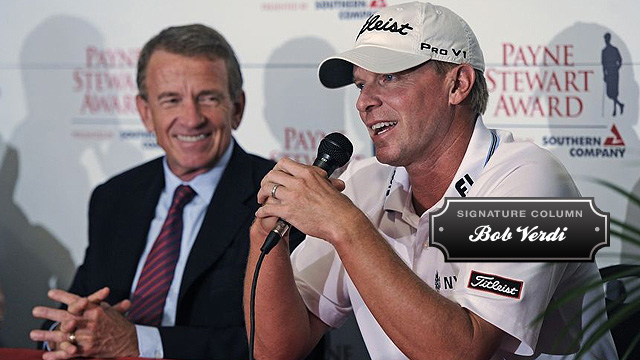Respected American player, Steve Stricker is a welcome recipient of this year’s Payne Stewart Award.
PGA Tour Commissioner, Tim Finchem announced the award earlier today at Atlanta and venue this week for the Tour Championship.
Hereunder is a transcript of the proceedings and of the questions asked by journalists present at the East Lake Club.
COMMISSIONER FINCHEM: Thank you for being here this afternoon. What’s going to happen this evening is one of the real fun things we do during the course of any year.
Over the last 12 years, 14 different players have been recognized for the Payne Stewart Award, which really stands for sportsmanship, comportment, preparation, giving back, conducting yourself well on the golf course and off. As a consequence, making a significant contribution to the image of the PGA TOUR, which, as we said many, many times, is our number one asset.
I’d like to introduce Steve Stricker to come out and join us. So, why Steve Stricker? I think as we’ll talk about this evening at the actual presentation, there is a committee made up of leaders of golf here and around the globe who along with the previous recipients of the award, provide input on who they think should be recognized as an individual who fits the criteria that I just alluded to.
Certainly Steve Stricker does that, and let me just first comment on Steve as a player. Steve has won a dozen times on the PGA TOUR, most of all of that since he was 40.
He is just a few years away, maybe, from playing some on the Champions Tour, but he continues to be a top player, evidenced by the fact that he’s in the top 30 here this year.
He was just picked by Davis Love to be part of the Ryder Cup team next week in Chicago. He is an incredible impacter of what’s going on right now, which is the PGA TOUR Playoffs for the FedExCup. He and Hunter Mahan are the only two players in the history of the Cup that have played in every single playoff event. In Steve’s case, he’s finished top 10 ten times. He’s won twice, and he’s become known as Mr.Fall. Along the way he has excited fans here and all around the world with the way he’s handled those wins and the way he’s handled himself in those competitions.
Q. You’ve won a lot out here. You’ve won comeback Player of the Year. We’ve seen you cry after a victory. What is the emotion from that you’re displaying today about winning this award?
STEVE STRICKER: Yeah, that’s a good question. Golf obviously means a lot to me, but the way I think I’ve tried to conduct myself over the years and try to set an example, lead down the proper road, lead by example, and Payne did that. The guys that have won this award prior to me have done that.
Those guys stand for what Payne was and what kind of person and what kind of player he was. To be thrown in that group of guys in that list of players is, like I say, something that I never had even thought about. Yes, so I think it’s important to me. Not only playing good golf, but the way you conduct yourself as a professional and go about your work out here on a daily basis. Like I say, to be part of that group is really special to me.
Q. What is your first memory of Payne, whether it was in person or on television or whatever?
STEVE STRICKER: Probably my very first memory of Payne is growing up watching him on TV. The one that sticks out in my mind the most, I think, a couple of things. I think it happened at the same event at Bay Hill when he kissed his daughter through the fence, if anybody remembers that, and then going on to win that tournament.
I think it was 1987 when I was looking back through his bio and his records and everything. But he went on to win that event and donating his whole winner’s check to a local hospital there in the Orlando area. In ’87 I was going to Illinois at the time, probably a sophomore at the time, just seeing somebody donate $106,000 right after you won the tournament to a charity stuck pretty firmly in my mind. Yeah, I think those couple things struck me right away.
Q. What about you personally?
STEVE STRICKER: I played with him my rookie year on TOUR in ’94. I can’t even remember where we played. But I can remember him struggling, and he wasn’t very happy with his game. I think he was struggling as we all do as players. You struggle with being out here, being on the road, with your game, being away from your family, and I think he had a pretty poor year that year in ’94. I was able to see that.
It was not only that time in ’94 playing with him, but it was what he had done then the next year in ’95 when he came back, and then the years leading up to, obviously, the win at the U.S. Open in ’99. But he came back. So I was able to see that firsthand how the guy struggled, and how he rededicated and refocused and got all his priorities right it seemed like.
How a guy like that was able to come back and how to do it. I actually thought about him quite a bit when I went through my own struggles. So it’s ironic in some ways that I was able to see that in Payne in ’94, but then to apply it to myself during my struggles in the mid 2000s.




